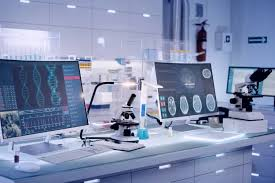Scientists continue to make discoveries every day. Innovations and instruments help them do so. They no longer need to rely solely on manual processes or isolated data, thanks to these highly connected environments. Innovative lab tools and methodologies are transforming the way researchers conduct their studies, making them faster, more precise, and leading to more impactful discoveries. What innovations should people expect in the coming months and years? Why will these innovations be important?
Artificial Intelligence and Machine learning
While instruments for scientific labs are becoming more innovative, researchers also benefit significantly from machine learning and AI. Scientists use this technology to process massive datasets and uncover hidden patterns. These tools can interpret experimental results and provide suggestions for future research. Researchers spend less time on routine tasks, allowing them to focus more on discovering new drugs and improving materials. The instruments they use in this process help further this research. For example, AI can be used to analyze cell cultures. From the culture flasks to the AI program used, every step of the process can be optimized thanks to these innovations.
Precision Automation
Automation is also being used to revolutionize lab operations. Advanced robots perform repetitive tasks with high precision and accuracy. These robots may handle samples, use instruments to dispense reagents, and complete multi-step protocols, freeing up scientists for other jobs. These systems allow scientists to oversee thousands of experiments simultaneously.
Automated liquid handlers are being used in labs to reduce human errors while minimizing the risk of contamination. Skilled workers can focus on tasks that require human attention. Furthermore, robotic systems work continuously without breaks. Doing so leads to increased experimental throughput, allowing scientists to benefit from larger and more reliable databases. The information they collect can be used to direct future research.
The Internet of Things (IoT)
The Internet of Things is being utilized to enhance laboratory responsiveness and intelligence. Sensors are deployed to monitor environmental conditions in real-time. Adjustments can be made as needed to ensure the conditions remain optimal and the sample integrity isn’t compromised. These sensors may also be used to monitor equipment performance and determine when maintenance is needed. Lab managers may rely on the IoT to track reagent levels and reorder supplies as needed. Safety and compliance increase when these tools are used. Operational efficiency also increases, making the results obtained more reliable and reproducible.
Sustainable Operations
Lab instruments are becoming more environmentally friendly, as sustainable practices are quickly becoming a necessity. Labs are working to reduce their energy consumption and waste. Green chemistry techniques are being employed, including the use of energy-efficient equipment, and labs are implementing waste reduction initiatives. Recycling programs are used, and microfluidic or miniaturized assays are being utilized to reduce the need for samples and reagents. Innovations like these will elevate science experimentation to a new level.
These innovations greatly benefit laboratories, but adopting them presents a greater challenge. Lab managers must find ways to integrate these diverse technologies while ensuring data remains safeguarded. Ethical considerations may also come into play; therefore, every lab needs robust frameworks in place to address these issues. Employee training is essential to minimize risks, and labs must prioritize interdisciplinary collaboration with the aid of these interconnected technologies. Sharing data will help advance science at a rapid rate, and breakthroughs made in these labs will help all humans.
read more : How to Choose the Best IPTV Service in Denmark

